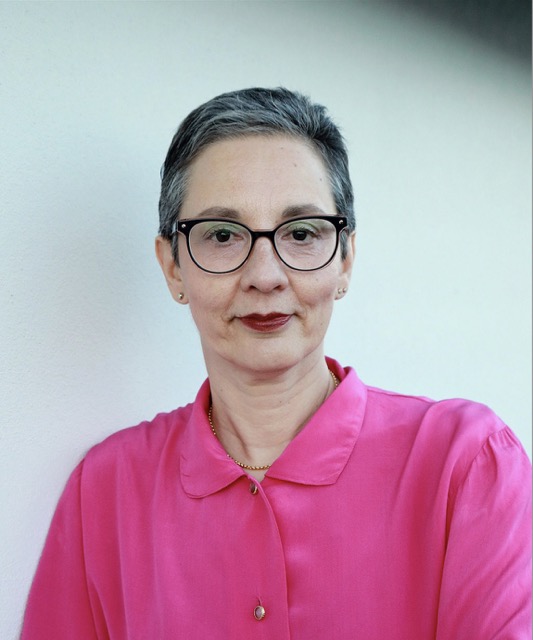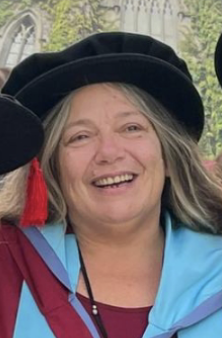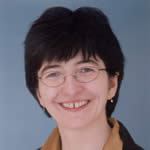-
Courses

Courses
Choosing a course is one of the most important decisions you'll ever make! View our courses and see what our students and lecturers have to say about the courses you are interested in at the links below.
-
University Life

University Life
Each year more than 4,000 choose University of Galway as their University of choice. Find out what life at University of Galway is all about here.
-
About University of Galway

About University of Galway
Since 1845, University of Galway has been sharing the highest quality teaching and research with Ireland and the world. Find out what makes our University so special – from our distinguished history to the latest news and campus developments.
-
Colleges & Schools

Colleges & Schools
University of Galway has earned international recognition as a research-led university with a commitment to top quality teaching across a range of key areas of expertise.
-
Research & Innovation

Research & Innovation
University of Galway’s vibrant research community take on some of the most pressing challenges of our times.
-
Business & Industry

Guiding Breakthrough Research at University of Galway
We explore and facilitate commercial opportunities for the research community at University of Galway, as well as facilitating industry partnership.
-
Alumni & Friends

Alumni & Friends
There are 128,000 University of Galway alumni worldwide. Stay connected to your alumni community! Join our social networks and update your details online.
-
Community Engagement

Community Engagement
At University of Galway, we believe that the best learning takes place when you apply what you learn in a real world context. That's why many of our courses include work placements or community projects.
Applied Multilingualism (MSc)
Course Overview
The MSc in Applied Multilingualism is designed to cater for increasing linguistic diversity in communities in Ireland, the EU and globally. Multilingualism is defined as using more than one language or being able to function, at some level, in more than one language. Some people grow up in multilingual communities where they acquire multiple languages from early on, while others learn foreign languages later in life. Different language circumstances have a different impact on individuals and communities. This innovative new programme welcomes Irish and international students alike.
John Walsh and Stanislava Antonijevic-Elliott (Programme Director), pictured at a recent University of Galway Postgraduate Open Day.
The main aims of the programme are to:
- Provide a learning environment and experience that fosters problem-solving, critical thinking and critical reflection in understanding, planning and catering for diverse multilingual people and their communities.
- Develop students’ professional competencies in the field of multilingualism within the boundaries of professional accountability and critically examine their professional role and expertise.
- Encourage students to develop their own professional and research interests and to demonstrate their knowledge and capability to critique current literature, adopt best-practice and develop, undertake and disseminate research in the field of multilingualism.
- Develop advanced skills and flexibility in attitudes that will enable students to manage projects related to and in collaboration with people from diverse backgrounds and language experiences in order to maximise the quality of life and well-being of those groups.
- Stimulate and support academically-oriented students further develop their academic career through a structured PhD in the field of multilingualism.
Applications and Selections
Applications are made online via the University of Galway Postgraduate Applications System. All will be required to submit a personal statement. Applicants who meet the minimum entry criteria will be considered. In the case of a high number of suitable applicants selection will be made on the basis of personal statements and interviews.
Who Teaches this Course
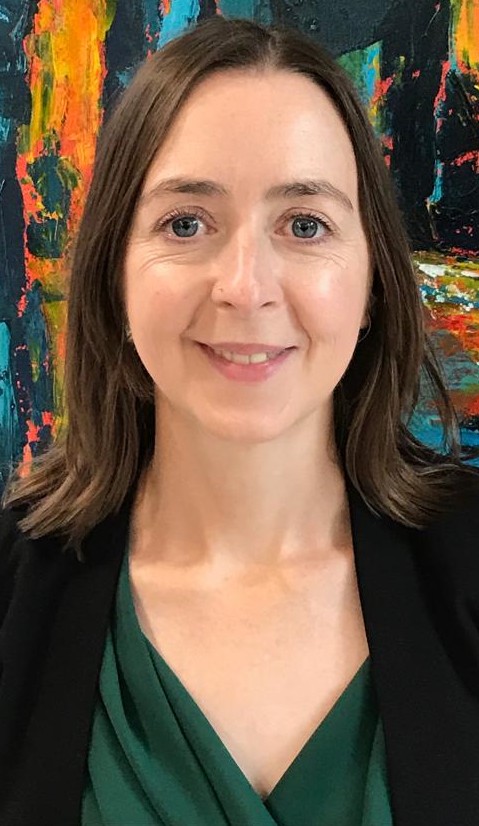
Áras Moyola
University of Galway
View Profile
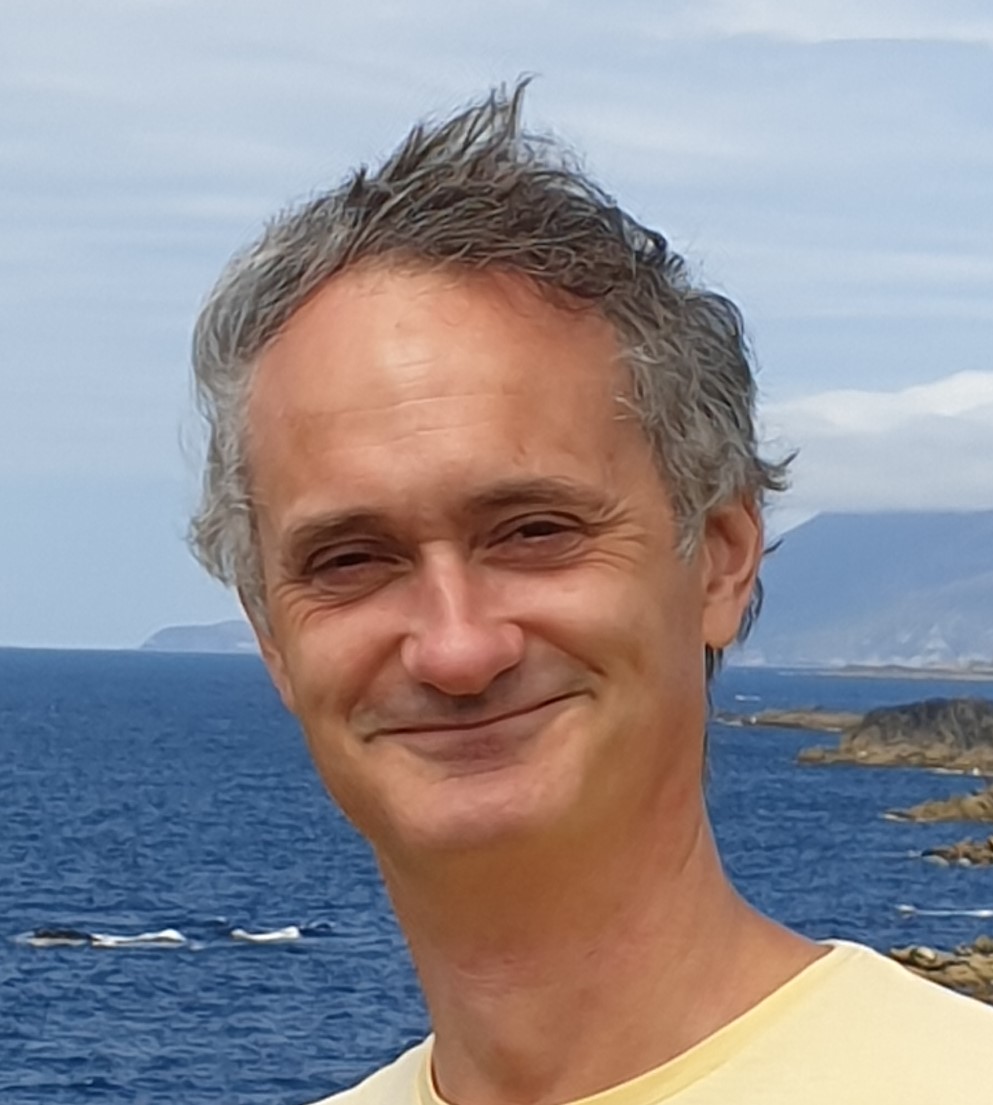
Roinn na Gaeilge
Ollscoil na Gaillimhe
Gaillimh
H91 TK33
View Profile
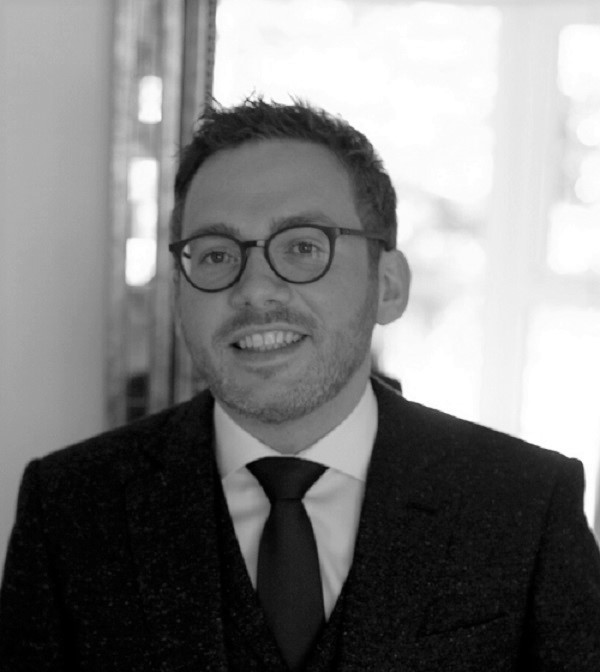
Roinn na Gaeilge
Áras na Gaeilge
Ollscoil na Gaillimhe
H91 TK33
View Profile
Requirements and Assessment
All modules involve continuous assessment in the form of written assignments and other forms of assessment as advised. Written and oral assignments will apply in the case of Advance Language Skills modules. Students are required to successfully complete a minor dissertation in order to achieve the award of MSc.
Key Facts
Entry Requirements
Applicants will be expected to possess a good quality first degree at NFQ Level 8 (at least an upper second class honours degree) or an equivalent qualification from Arts programmes (e.g., languages, education, psychology, sociology and political science, geography) or from medical, nursing, and health care programmes (e.g., speech and language therapists, occupational therapists, public health nurses). Applicants intending to take modules in Advanced Language Skills will have to possess language proficiency that is equivalent to B2 level according to the Common European Framework of Reference for Languages. Applicants are required to fulfill the following English language requirements.
Additional Requirements
Recognition of Prior Learning (RPL)
Duration
1 year (full-time); 2 years (part-time)
Next start date
September 2024
A Level Grades ()
Average intake
20
QQI/FET FETAC Entry Routes
Closing Date
Please view the offer rounds website.
NFQ level
Mode of study
ECTS weighting
90 ECTS (full-time); part time pro-rata
Award
CAO
Course code
MSC-AML
Course Outline
Click here for (2022–23) module details.
Bilingual commercial sign in Luxembourgish and French in Luxembourg City. Luxembourg is officially trilingual but is a highly multilingual society.

Trilingual road sign in Val Gardena in northern Italy, where Ladin, German and Italian are spoken.
Why Choose This Course?
Career Opportunities
Increasingly multilingual societies are creating demand for professionals in the fields of health, education, public administration and NGOs who are equipped to work with multilingual populations. Furthermore, improving language skills is relevant for those intending to seek employment in the areas of language planning and policy, language teaching, cultural and heritage institutions, government and diplomacy. Possible career avenues include:
- Health professionals providing services to multilingual populations
- Educational professionals working with multilingual populations
- NGO staff working with linguistic diversity
- Organisations working with minority languages and language planning
- International organisations specialising in language policy (EU, UNESCO, OSCE, etc.)
- Civil servants employed in administrations with a remit to serve more than then one language community
- Employees in diplomatic services and cultural/heritage organisations
- Academic/research careers
CALM
Who’s Suited to This Course
Learning Outcomes
Transferable Skills Employers Value
Work Placement
Study Abroad
Related Student Organisations
Course Fees
Fees: EU
Fees: Tuition
Fees: Student levy
Fees: Non EU
Postgraduate students in receipt of a SUSI grant—please note an F4 grant is where SUSI will pay €4,000 towards your tuition (2023/24). You will be liable for the remainder of the total fee. An F5 grant is where SUSI will pay tuition up to a maximum of €6,270. SUSI will not cover the student levy of €140.
Postgraduate fee breakdown = Tuition (EU or NON EU) + Student levy as outlined above.
Note to non-EU students: learn about the 24-month Stayback Visa here
Find out More
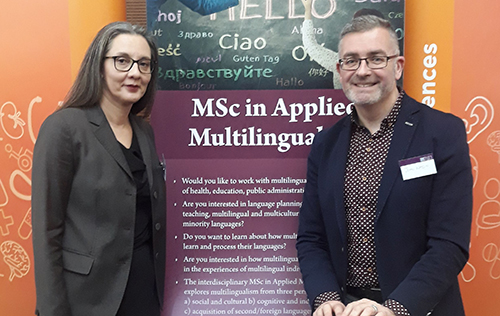
John Walsh and Stanislava Antonijevic-Elliott (Programme Director), pictured at a recent University of Galway Postgraduate Open Day.
Dr Stanislava Antonijevic-Elliott
School of Health Sciences,
Áras Moyola,
University of Galway,
Galway
T: +353 91 495 623
E: stanislava.antonijevic@universityofgalway.ie








